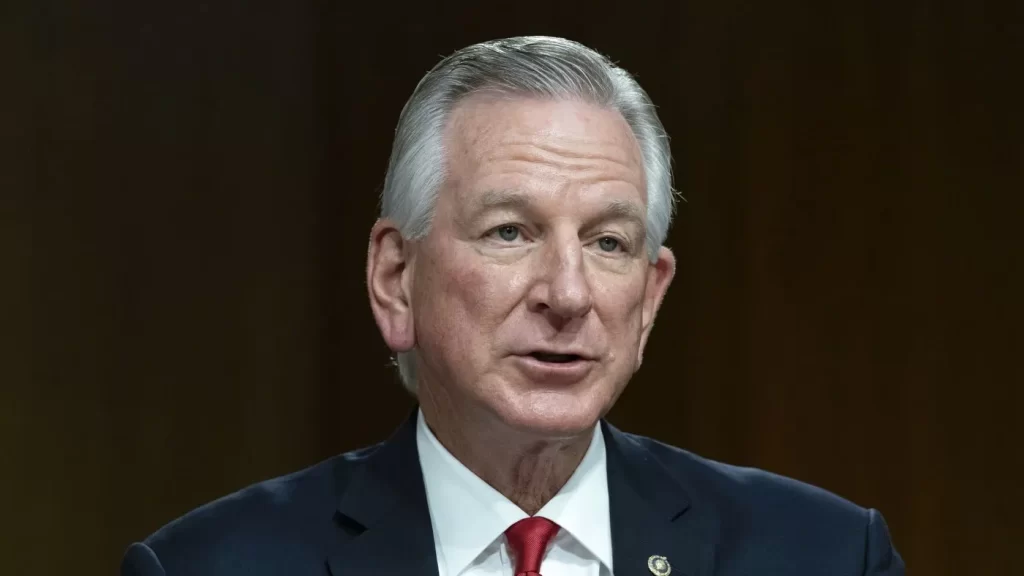Senator Tuberville Blocks Promotion of Top Defense Aide Amid Ongoing Controversy
3 min read

Senator Tommy Tuberville has placed a hold on the promotion of Lt. Gen. Ronald Clark, a senior aide to Secretary of Defense Lloyd Austin. This move, confirmed by Tuberville’s spokesperson Mallory Jaspers, centers around concerns regarding Clark’s actions during a period of Secretary Austin’s hospitalization.
“Sen. Tuberville has concerns about Lt. Gen. Clark’s actions while Secretary Austin was incapacitated,” Jaspers said. “Lt. Gen. Clark was aware that Secretary Austin was unable to perform his duties but did not inform the Commander in Chief. As a senior officer, Clark’s responsibility is to alert the President when the chain of command is disrupted.”
This latest hold marks a shift from Tuberville’s broader stance last year, when he imposed a blanket hold on all military promotions in protest of the Pentagon’s abortion policy. According to sources familiar with the situation, the current hold on Clark’s nomination could potentially be resolved through procedural motions, as it involves a single nomination rather than the hundreds affected by Tuberville’s previous action.
The outcome of the Pentagon’s inspector general report, which was initiated earlier this year, could influence the future and timing of Clark’s confirmation. The review aims to assess whether the Pentagon’s policies adequately support an effective transfer of power and duties following Austin’s hospitalizations, which were not promptly communicated to the White House or senior national security officials.
Jaspers noted that Tuberville is “waiting to see the forthcoming IG report” before making further decisions.
Clark’s nomination, first reported by The Washington Post, has been met with criticism from Pentagon officials. James Adams, a Pentagon spokesperson, emphasized Clark’s qualifications, noting his extensive experience as commander of US Army Central, the Army’s 25th Infantry Division, and chief of staff for US Army Pacific. “We urge the Senate to confirm all of our qualified nominees,” Adams said. “These holds undermine our military readiness.”
Secretary Austin’s hospitalization on January 1 due to complications from a prostate cancer procedure in December became public only on January 5. The Pentagon later revealed that Austin had not notified Congress or the White House about his diagnosis, procedure, or subsequent complications, a lapse that stirred controversy on Capitol Hill. During a February hearing, Congress members, particularly Republicans, scrutinized Austin’s delay in informing lawmakers and President Biden about his condition.
In July, Austin announced that President Biden had nominated Clark, who is currently serving as Austin’s senior military assistant, to be the commanding general of US Army Pacific.
With Clark’s nomination now under consideration, Senate Majority Leader Chuck Schumer could potentially bring it to a vote. Tuberville’s hold cannot indefinitely block the confirmation, and Schumer has the authority to schedule an up-or-down vote.
Last year, Tuberville faced substantial bipartisan pressure to lift his extensive hold on military promotions, which had been in place since March and had delayed over 450 top military nominees. Prominent military leaders, including Air Force Secretary Frank Kendall, Navy Secretary Carlos Del Toro, and Army Secretary Christine Wormuth, criticized the holds for potentially aiding US adversaries.
Tuberville had initially imposed the holds to protest the Pentagon’s post-Roe v. Wade policy, which provides reimbursements for service members who travel out of state for reproductive services, including abortions. He eventually lifted most of his holds late last year, allowing for the confirmation of many military nominations.
As the debate over Clark’s promotion continues, the interplay between military readiness and political stances remains a central issue in Washington’s ongoing discussions about defense and national security.